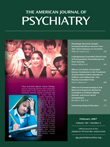Abstract
Objective: The authors studied a dense map of single nucleotide polymorphism (SNP) DNA markers on chromosome 15q25-q26 to maximize the informativeness of genetic linkage analyses in a region where they previously reported suggestive evidence for linkage of recurrent early-onset major depressive disorder. Method: In 631 European-ancestry families with multiple cases of recurrent early-onset major depressive disorder, 88 SNPs were genotyped, and multipoint allele-sharing linkage analyses were carried out. Marker-marker linkage disequilibrium was minimized, and a simulation study with founder haplotypes from these families suggested that linkage scores were not inflated by linkage disequilibrium. Results: The dense SNP map increased the information content of the analysis from around 0.7 to over 0.9. The maximum evidence for linkage was the Z likelihood ratio score statistic of Kong and Cox (Z LR )=4.69 at 109.8 cM. The exact p value was below the genomewide significance threshold. By contrast, in the genome scan with microsatellite markers at 9 cM spacing, the maximum Z LR for European-ancestry families was 3.43 (106.53 cM). It was estimated that the linked locus or loci in this region might account for a 20% or less populationwide increase in risk to siblings of cases. Conclusions: This region has produced modestly positive evidence for linkage to depression and related traits in other studies. These results suggest that DNA sequence variations in one or more genes in the 15q25-q26 region can increase susceptibility to major depression and that efforts are warranted to identify these genes.



